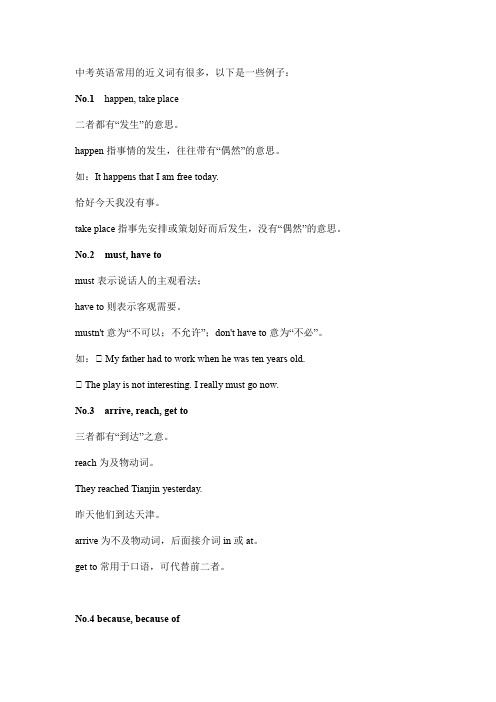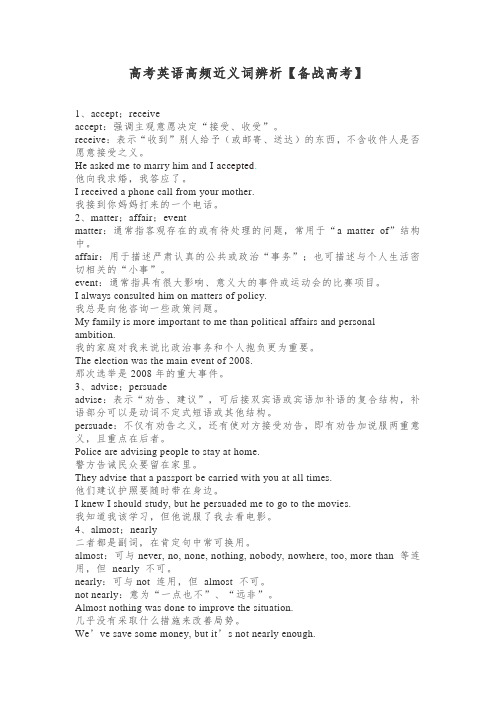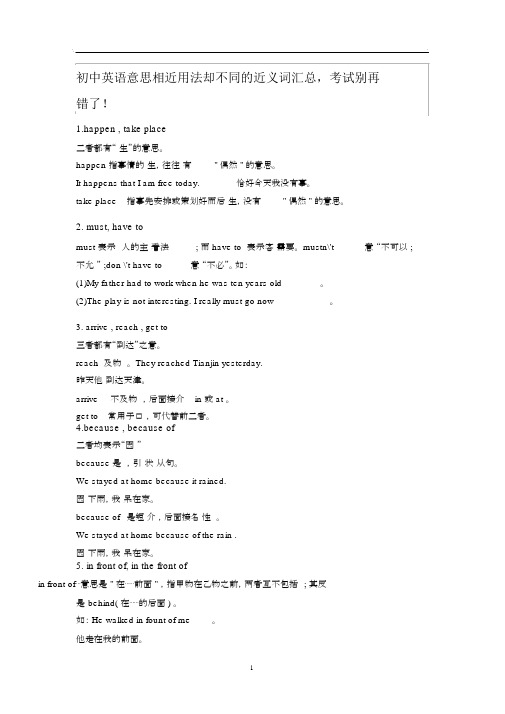高中生近义词使用调查——以happen和takeplace为例
高中生近义词使用调查——以happen和take place为例

等 显而易见 . 学习者在搭配词 的丰富程度上
( 2 0 0 5 ) 、 任培红 ( 2 0 0 8 ) 等。 这些研究都 以大学 生 为调查 对象 .对高 中学生使用 近义词 的情 况关 注几 乎没有涉及 本文采 用基于语料库
c l a s s i i f c a t i o n, r a p e , s t o r y , d i s t o r t i o n, i n c i d e n t , k i l l i n g ,
c o mmu n i c a t i o n, e l e c t i o n, ma r i r a g e, a c c o mp l i s h me n t ,
( 2 ) T h e s t o r y w a s【 v p 7 , 2 - 1 ] s a i d t h a t D i n g
D u n g w i t h w d l , 一 3 1 i t s f i r e n d s c a m e i n t o o t h e r
2 . h a p p e n  ̄用法 比较
于使用传 统的办法 .通过借助词典 列举例句
对相关 的词 进行定义和描述 .或者 仅凭个人
的经验来 总结近义词之 间的区别.而得 出的
( 1 3 次) , a c c i d e n t , s t o r y , t h i n g , e x p e i r e n c e ;在U S
近义 词的教 学一 直是我 国英语 教学 . 特 别是 中学英语教 学中的一个难点 说 它难是 因为 . 一方 面 . 无论是教 师还是 学生基本上都
take place和happen-精选学习文档

happen , take place二者都有“发生”的意思。
happen指“偶然发生”时,主语为“事”;当主语是“人”时,意为“碰巧”。
happen 指事情的发生,往往带有“偶然”的意思。
He happened to know the place.他碰巧知道那个地方。
When did the earthquake happen?地震是什么时候发生的﹖Has anything happened to him﹖他出什么事了吗﹖I dread to think what will happen next.我不愿想下一次会发生什么。
These events were clearly predestined to happen.这些事件是不可避免要发生的。
Daniel: Do you have the workers to save me if anything should happen?丹尼尔: 如果发生什么情况,你们会有工作人员来救我吗?It happens that I am free today.恰好今天我没有事。
take place指事先安排或策划好而后发生,没有“偶然”的意思;此外take place 还可表示“举行某种活动”。
如:In 1919, the May 4th Movement took place in China.一九一九年,中国发生了五四运动。
When does the wedding come off [take place]?什么时候举行婚礼?Nonetheless, the crew members will know that, if a mission to the Red Planet ever does take place, they will have played a significant part in it.尽管如此,机组人员会明白,如果前往红色星球的任务真的会发生的话,他们将在其中扮演一个举足轻重的角色。
基于COCA语料库的英语近义表达辨析——以happen和take place为例

2342020年34期总第526期ENGLISH ON CAMPUS基于COCA 语料库的英语近义表达辨析——以happen 和take place 为例文/尹思婷【摘要】在实际的语言使用中,英语学习者常常会误用英语近义表达。
本文选取happen和take place这对近义表达作为研究对象,以COCA语料库为研究工具,探讨两个表达在频率分布、类联结、搭配、语义韵方面的不同,说明在教学中如何利用语料库对近义表达进行辨析,以帮助学习者掌握更贴近本族语的表达。
【关键词】语料库;近义词;搭配;语义韵【作者简介】尹思婷,华南师范大学。
一、引言在实际的语言交际与使用中,词语表达的选用大大影响了信息传递与沟通的有效性。
因此,在语言学习与使用上,近义词及近义表达的辨析也尤为重要。
在英语中,近义词以及近义表达的数量庞大,为英语教师的教学与中国英语学习者的学习造成了很大的障碍。
语料库则为近义表达的辨析提供了更真实与直观的途径,能帮助学习者明晰不同表达的搭配、语义韵等的不同。
以往的辨析研究主要集中在名词、副词和动词等近义词的辨析上,而对近义表达的辨析相对匮乏。
但在英语学习中存在大量类似happen与take pace这样高频使用的近义表达,亦是值得关注与研究的方向。
因此,本文选择happen与take pace作为研究对象,基于COCA语料库探讨happen与take pace在频率分布、类联结、搭配、语义韵上的不同。
二、研究设计1. 研究工具。
语料库是指按照一定的语言学原则,运用随机抽样的方法,收集自然出现的连续的语言运用文本或话语片段而建成的具有一定容量的大型电子文库。
真实丰富的语料、便捷的操作方式为近义表达的辨析提供了便利。
美国当代英语语料库(COCA)是目前世界上最大的英语在线免费语料库,包括口语、小说、杂志、报纸、学术期刊五大类型的语料,其词汇量高达5.6亿,且每年新增2000万的新词,时效性强。
2. 研究方法。
最新初中英语,意思相近用法却不同的近义词汇总!

初中英语,意思相近用法却不同的近义词汇总!初中英语中有很多常用短语意义相近却不相同,常常出现在考试中,一不小心就会选错或用错,今天为大家总结了用法不同的近义词/词组,这也是初中英语学习的重点和中考英语必考的知识点,希望大家可以在学习中理解、对比记忆在考试中千万不要用错!1、happen , take place二者都有“发生”的意思。
happen指事情的发生,往往带有"偶然"的意思。
It happens that I am free today. 恰好今天我没有事。
take place指事先安排或策划好而后发生,没有"偶然"的意思。
2、must, have tomust表示说话人的主观看法;而have to则表示客观需要。
mustn\'t意为“不可以;不允许”;don\'t have to意为“不必”。
如:(1)My father had to work when he was ten years old。
(2)The play is not interesting. I really must go now。
3、arrive , reach , get to三者都有“到达”之意。
reach为及物动词。
They reached Tianjin yesterday.昨天他们到达天津。
arrive为不及物动词,后面接介词in或at。
get to常用于口语,可代替前二者。
4、because , because of二者均表示“因为”because是连词,引导状语从句。
We stayed at home because it rained.因为下雨,我们呆在家。
because of是短语介词,后面接名词性词语。
We stayed at home because of the rain .因为下雨,我们呆在家。
5、in front of, in the front ofin front of…意思是"在……前面",指甲物在乙物之前,两者互不包括;其反义词是behind(在……的后面)。
take place的同义词组

take place的同义词组“Take place” 同义词组可以有很多,这里列举几个常用的同义词组:1. Occur: 发生、出现。
Occur 是 take place 的一个常见同义词,表示“发生或出现”的意思。
例如:The accident occurred on a busy street.2. Happen: 发生、出现。
Happen 是 take place 的另一个常见同义词,表示“发生或出现”的意思。
例如:The meeting happened last week.3. Transpire: 发生、出现。
Transpire 是 take place 的另一个更少见的同义词,表示“发生或出现”的意思。
例如:Strange things transpired during the night.4. Take effect: 生效、实施。
Take effect 是take place 的另一个同义词,表示“生效或实施”的意思。
例如:The new regulations will take effect next month.5. Be held: 举行、举办。
Be held 是 take place 的另一个同义词,表示“举行或举办”的意思。
例如:The conference will be held in New York.6. Come about: 发生、传出。
Come about 是 take place 的另一个同义词,表示“发生或传出”的意思。
例如:Rumors came about that the company was going bankrupt.7. Occasion: 举行、举办。
Occasion 是 take place 的另一个同义词,表示“举行或举办”的意思。
例如:We are planning to have an occasion for my father's birthday.8. Arise: 出现、发生。
takeplace,happen,occur,comeabout和breakout用法区别

take place, happen, occur, come about和break out用法区别这些词或短语都有“发生”的意思,但用法各不相同,区别如下:(1). take place 表示“发生、举行、举办”,一般指非偶然性事件的“发生”,即这种事件的发生一定有某种原因或事先的安排,例如:Great changes have taken place in our hometown during the past ten years.The Olympic Games of 2008 will take place in Beijing.(2) .happen作“发生、碰巧”解,一般用于偶然或突发性事件,例如:What happened to you (一般不说:What did you happen)Maybe something unexpected happened.I happened to see him on my way home.= It happened that I saw him on my way home.(3). occur作“发生、想到、突然想起”解,其意义相当于happen,例如:What has occurred (=What has happened)A big earthquake occurred (=happened) in the south of China last month.It occurred to me that she didn’t know I had moved into the new house.(4). come about表示“发生、产生”,多指事情已经发生了,但还不知道为什么,常用于疑问句和否定句,例如:When Mother woke up, she didn’t know what had come about.I’ll never understand how it came about that you were late three times a week.Do you know how the air accident came about(5). break out意思为“发生、爆发”,常指战争、灾难、疾病或者争吵等事件的发生,也可以表示突然大声叫喊等,例如:Two world wars broke out last century.A fire broke out in the hospital in the mid-night.After the flood, diseases broke out here and there.She broke out, “That is too unfair!”occur vi. 1发生2 想起,想到常用搭配:sth. occurs to sb.:某人突然想起某事;It never occurred to sb. that…:某人从未想到……More people are afraid to take planes because several air crashes have occurred this month. Suddenly a good idea occurred to her.It never occurred to us that the well-dressed man was a pickpocket.我们决没有想到,那个衣冠楚楚的人是个扒手。
大量动词辨析中考

want用于口语,表达迫切的愿望。常用于: 1、 want+n./pron.想要某 物 e.g. I want a new pen. 2、 Want+to do sth.要做某事 e.g. I want to buy the bike. 3、 Want+sb.to do sth.(需)要某人做某事。 e.g. the teacher wants us to clean the classr oom. 4、 Want+sth.done 想要别人把某事作了。 e.g. He wants the work done at once. 5、Sth+want+ doing/to be done某事需要做。 e.g. The windows wants cleaning/to be clea ned. 窗户需要被修理
bring, take 与carry
bring 意为“带来;拿来”,朝着说话
人. take意为“带走;拿走”,远离说话
人.
carry意为“搬运;携带;肩挑;手拿” 等,
经典例析
1.--Will you please show me the photo of your family ? B it here tomorrow. --OK, I’ll _____ A. take B. bring C. carry D. catch B 2. It’s raining hard outside, please____ an umbrella with you. A. bring B. take C. carry D. hold
3.The man was badly hurt. Some people ____ C him into a hospital as soon as possible. A. carried B. brought
初中英语意思相近用法却不同的近义词汇总

初中英语意思相近用法却不同的近义词汇总,以后别再错happen , take place二者都有“发生”的意思。
happen指事情的发生,往往带有"偶然"的意思。
It happens that I am free today. 恰好今天我没有事。
take place指事先安排或策划好而后发生,没有"偶然"的意思。
must, have tomust表示说话人的主观看法;而have to则表示客观需要。
mustn\'t意为“不可以;不允许”;don\'t have to意为“不必”。
如:(1)My father had to work when he was ten years old。
(2)The play is not interesting. I really must go now。
arrive , reach , get to三者都有“到达”之意。
reach为及物动词。
They reached Tianjin yesterday.昨天他们到达天津。
arrive为不及物动词,后面接介词in或at。
get to常用于口语,可代替前二者。
because , because of二者均表示“因为”because是连词,引导状语从句。
We stayed at home because it rained.因为下雨,我们呆在家。
because of是短语介词,后面接名词性词语。
We stayed at home because of the rain .因为下雨,我们呆在家。
in front of, in the front ofin front of…意思是"在……前面",指甲物在乙物之前,两者互不包括;其反义词是behind(在……的后面)。
如:He walked in fount of me。
他走在我的前面。
There are some flowers in fount of the house。
初中英语意思相近用法却不同的近义词汇总

初中英语意思相近用法却不同的近义词汇总,考试别再错了!1.happen , take place二者都有“发生”的意思。
happen指事情的发生,往往带有"偶然"的意思。
It happens that I am free today. 恰好今天我没有事。
take place指事先安排或策划好而后发生,没有"偶然"的意思。
2. must, have tomust表示说话人的主观看法;而have to则表示客观需要。
mustn\'t意为“不可以;不允许”;don\'t have to意为“不必”。
如:(1)My father had to work when he was ten years old。
(2)The play is not interesting. I really must go now。
3. arrive , reach , get to三者都有“到达”之意。
reach为及物动词。
They reached Tianjin yesterday.昨天他们到达天津。
arrive为不及物动词,后面接介词in或at。
get to常用于口语,可代替前二者。
4.because , because of二者均表示“因为”because是连词,引导状语从句。
We stayed at home because it rained.因为下雨,我们呆在家。
because of是短语介词,后面接名词性词语。
We stayed at home because of the rain .因为下雨,我们呆在家。
5. in front of, in the front ofin front of…意思是"在……前面",指甲物在乙物之前,两者互不包括;其反义词是behind(在……的后面)。
如:He walked in fount of me。
中考英语常用近义词

中考英语常用的近义词有很多,以下是一些例子:No.1 happen, take place二者都有“发生”的意思。
happen指事情的发生,往往带有“偶然”的意思。
如:It happens that I am free today.恰好今天我没有事。
take place指事先安排或策划好而后发生,没有“偶然”的意思。
No.2 must, have tomust表示说话人的主观看法;have to则表示客观需要。
mustn't意为“不可以;不允许”;don't have to意为“不必”。
如:① My father had to work when he was ten years old.① The play is not interesting. I really must go now.No.3 arrive, reach, get to三者都有“到达”之意。
reach为及物动词。
They reached Tianjin yesterday.昨天他们到达天津。
arrive为不及物动词,后面接介词in或at。
get to常用于口语,可代替前二者。
No.4 because, because of二者均表示“因为”。
because是连词,引导状语从句。
We stayed at home because it rained.因为下雨,我们呆在家。
because of是短语介词,后面接名词性词语。
We stayed at home because of the rain.因为下雨,我们呆在家。
No.5 in front of, in the front ofin front of…意思是“在……前面”,指甲物在乙物之前,两者互不包括;其反义词是behind(在……的后面)。
如:He walked in front of me.他走在我的前面。
There are some flowers in front of the house.房子前面有些花卉。
英语近义词5

ignore不顾,不理,常指有意地不理,不加分析地拒绝考虑。
如:She saw him coming but she ignored him.103.happen, occur, take place均表示“发生”。
happen是常用词,指偶然或按计划的发生。
如:When did the explosion happen?(爆炸什么时候发生?)occur是较正式的用词,主要用以指无计划的发生。
take place多表示情况或事情按计划发生。
如:The story took place in 1917.(故事发生在1917年。
)104.chance, opportunity, occasionchance多指偶然的机会,意外的机会,带有侥幸的意味。
如:Even so, it was a lucky chance that he could do it.(即使如此,那也是他凭着侥幸才做到这点。
)opportunity主要指能够去做某事,尤其是达到自己目的,实现某种愿望的好机会。
如:You should make the most of your opportunities of seeing the country and learning the language.(你应该尽量利用你的机会去看看这个国家,学习它的语言。
)occasion主要指“时机”,“场合”,也含有“机会”的意思。
如:The f lags are hung out on the occasion of the National Day.(每逢国庆节,国旗都悬持出来了。
)105.persist, insistpersist坚持,后面常接介词in。
如:He persisted in carrying on his work in spite of great fatigue.(他虽然疲倦极了,可仍坚持工作。
)insist坚持,后面接介词on,也可直接连用tha t引导的名词从句。
同义词辨析:happen、takeplace与occur

同义词辨析:happen、takeplace与occur
happen 常常有“偶然”的意思,多用于客观事物、情况的发生。
例如:
Whatever has ha ppened to your arm?It's all swollen.
你的手臂怎么了?肿得好历害。
occur 指有计划使某些事或效果“发生”。
有时强调“呈现”于人的知觉中。
例如:
Did it occur to you to phone them about it?
你难道没想到就这事给他们打个电话?
在以具体事物、事件作主语时,happen和occur可以通用。
例如:
The accident happened (occurred) yesterday.
事故是昨天发生的。
take place 指事件发生,但常用来表示“举行”的意思,带有非偶然性。
例如:
The mee ting took place last night.会议昨晚举行。
你知道了吗?。
高中生近义词使用调查:以happen和take place为例

摘要通过对比分析中国高中学生与本族语者对近义词happen和take place使用情况发现,学习者在类连接、搭配词和语义韵上都表现出明显的差异。
关键词近义词语料库使用情况Survey on Senior High School Students'Use of Synonyms: A Case Study on"Happen"and"Take Place"//Chen HongmeiAbstract Through a comparative analysis on the use of happen and take place by Chinese senior high school students and the native speakers,the writer finds that there are differences in work connection,collocation and semantic prosody among learners. Key words synonyms;corpus;use situation1引言近义词的教学一直是我国英语教学,特别是中学英语教学中的一个难点。
说它难是因为,一方面,无论是教师还是学生基本上都无法像英语本族语者那样凭直觉判断近义词的具体使用;另一方面,教师在教学中多倾向于使用传统的办法,通过借助词典列举例句对相关的词进行定义和描述,或者仅凭个人的经验来总结近义词之间的区别,而得出的结论或有偏颇之处,学生习得近义词也受到影响。
近年来,语料库语言学的发展为解决此类问题提供了强有力的工具,有些研究者已经将语料库的研究手段用于近义词的研究与教学中,如孙海燕(2004)、张继东和刘萍(2005)、任培红(2008)等。
这些研究都以大学生为调查对象,对高中学生使用近义词的情况关注几乎没有涉及。
初中英语意思相近用法却不同的近义词汇总

初中英语意思相近用法却不同的近义词汇总初中英语中有很多常用短语意义相近却不相同,常常出现在考试中,一不小心就会选错或用错,今天就为大家总结了用法不同的近义词/词组,这也是初中英语学习的重点和中考英语必考的知识点,希望大家可以在学习中理解、对比记忆在考试中千万不要用错!1. happen , take place二者都有“发生”的意思。
happen指事情的发生,往往带有"偶然"的意思。
It happens that I am free today. 恰好今天我没有事。
take place指事先安排或策划好而后发生,没有"偶然"的意思。
2. must, have tomust表示说话人的主观看法;而have to则表示客观需要。
mustn\'t意为“不可以;不允许”;don\'t have to意为“不必”。
如:(1)My father had to work when he was ten years old。
(2)The play is not interesting. I really must go now。
3. arrive , reach , get to三者都有“到达”之意。
reach为及物动词。
They reached Tianjin yesterday.昨天他们到达天津。
arrive为不及物动词,后面接介词in或at。
get to常用于口语,可代替前二者。
4.because , because of二者均表示“因为”because是连词,引导状语从句。
We stayed at home because it rained. 因为下雨,我们呆在家。
because of是短语介词,后面接名词性词语。
We stayed at home because of the rain . 因为下雨,我们呆在家。
5. in front of, in the front ofin front of…意思是"在……前面",指甲物在乙物之前,两者互不包括;其反义词是behind(在……的后面)。
高考英语高频近义词辨析【备战高考】

高考英语高频近义词辨析【备战高考】1、accept;receiveaccept:强调主观意愿决定“接受、收受”。
receive:表示“收到”别人给予(或邮寄、送达)的东西,不含收件人是否愿意接受之义。
He asked me to marry him and I accepted.他向我求婚,我答应了。
I received a phone call from your mother.我接到你妈妈打来的一个电话。
2、matter;affair;eventmatter:通常指客观存在的或有待处理的问题,常用于“a matter of”结构中。
affair:用于描述严肃认真的公共或政治“事务”;也可描述与个人生活密切相关的“小事”。
event:通常指具有很大影响、意义大的事件或运动会的比赛项目。
I always consulted him on matters of policy.我总是向他咨询一些政策问题。
My family is more important to me than political affairs and personal ambition.我的家庭对我来说比政治事务和个人抱负更为重要。
The election was the main event of 2008.那次选举是2008年的重大事件。
3、advise;persuadeadvise:表示“劝告、建议”,可后接双宾语或宾语加补语的复合结构,补语部分可以是动词不定式短语或其他结构。
persuade:不仅有劝告之义,还有使对方接受劝告,即有劝告加说服两重意义,且重点在后者。
Police are advising people to stay at home.警方告诫民众要留在家里。
They advise that a passport be carried with you at all times.他们建议护照要随时带在身边。
「考点精讲」辨析happen与takeplace

「考点精讲」辨析happen与takeplace happen和take place的共同点:1、都有“发⽣”之意;2、都没有被动语态。
happen和take place的不同之处:happen,(1)“(偶然)发⽣”。
表⽰某⼈发⽣某事(某事做主语),⽤sth. happen to sb. 例如:What happened to him?他发⽣什么事情了?happen,(2)“(偶然)发⽣”。
表⽰某地/某时发⽣了某事(某事做主语),⽤sth. happen +时间/地点例如:The traffic accident happened last night.昨晚发⽣了这起交通事故。
Where did the earthquake happen?地震是在哪⾥发⽣的?happen,(3)“碰巧”。
表⽰某⼈碰巧做了某事(某⼈做主语),⽤sb. happen to do sth. 和 It happens +that 从句。
例如:I happened to be there. 我碰巧在那⼉。
It happened that he met his parents on the street. 他碰巧在遇到了他⽗母亲。
take place ,“发⽣”。
指事先计划好或预先布置好的某种确定事件发⽣。
此外,还可指举⾏某种活动。
例如:Great changes took place last year in my hometown.去年我的家乡发⽣了巨⼤变化。
The meeting will take place soon.会议即将举⾏。
Let's have a try.谢谢!。
初中英语意思相近用法却不同的近义词汇总.docx

初中英语意思相近用法却不同的近义词汇总,考试别再错了!1.happen , take place二者都有“ 生”的意思。
happen 指事情的生,往往有" 偶然 " 的意思。
It happens that I am free today.恰好今天我没有事。
take place指事先安排或策划好而后生,没有" 偶然 " 的意思。
2. must, have tomust 表示人的主看法; 而 have to 表示客需要。
mustn\'t意“不可以 ;不允” ;don \'t have to意“不必”。
如:(1)My father had to work when he was ten years old。
(2)The play is not interesting. I really must go now。
3. arrive , reach , get to三者都有“到达”之意。
reach 及物。
They reached Tianjin yesterday.昨天他到达天津。
arrive不及物,后面接介 in 或 at 。
get to常用于口,可代替前二者。
4.because , because of二者均表示“因”because 是,引状从句。
We stayed at home because it rained.因下雨,我呆在家。
because of是短介,后面接名性。
We stayed at home because of the rain .因下雨,我呆在家。
5. in front of, in the front ofin front of⋯意思是"在⋯⋯前面",指甲物在乙物之前,两者互不包括; 其反是behind( 在⋯⋯的后面 ) 。
如: He walked in fount of me。
他走在我的前面。
There are some flowers in fount of the house。
- 1、下载文档前请自行甄别文档内容的完整性,平台不提供额外的编辑、内容补充、找答案等附加服务。
- 2、"仅部分预览"的文档,不可在线预览部分如存在完整性等问题,可反馈申请退款(可完整预览的文档不适用该条件!)。
- 3、如文档侵犯您的权益,请联系客服反馈,我们会尽快为您处理(人工客服工作时间:9:00-18:30)。
3结果 与讨论
3 . 1总体分布 在S T 2 语 料库 中 h a p p e n和 t a k e p l a c e 分别出现了 7 2次 和2 0次。在 u s 语 料库中 h a p p e n和 t a k e p l a c e出现次数分 别为 8 9次和 3 1 次 。从统计数据上可以看出 , 无论是英语本
摘 要 通 过 对 比分 析 中 国高 中 学 生 与本 族 语者 对 近 义 词
h a p p e n和 t a k e P ] a C e使 用 情 况 发 现 , 学 习者 在 类 连 接 、
搭 配词 和 语 义 韵 上 都表 现 出 明显 的 差 异。
( C L E C ) 中的 S T 2字库 , 即高 中学生 的作文语料 , 约2 0 0 , 0 0 0 词。用来做对比的英语母语选 自L O C N E S S语料库 中的美国 分库( 以下简称 U S ) 。 该库库容约 为 1 7 0 , 0 0 0词 , 主要是美 国 大学 生 缩 写 的 议论 文 。
2 . 3研 究 问 题
关键 词 近 义词 语 料 库 使 用 情 况
S u r v e y o n S e n i o r Hi g h S c h o o l S t u d e n t s ’ Us e o f S y n o n y ms :
A Ca s e S t u d y o n ” Ha p p e n ” a n d ” Ta k e P l a c e ” / /C h e n
是学生基本上都无法像英语本族语者那样凭直觉判断 近义 词 的具体使用 ; 另一方 面 , 教师在教学 中多倾 向于使用传 统 的办法 ,通过借助词典列举 例句对相关 的词进行定义 和描 述, 或者仅 凭个 人的经验来 总结近义词 之问的区别 , 而得 出 的结论或有偏颇之处 ,学生习得近义词也受 到影 响。近年 来 ,语料库语言学的发展为解决此类 问题提供 了强有力的 工具 , 有些研 究者 已经将语料库 的研 究手段用于近义 词的 研究 与教学 中, 如孙海燕 ( 2 0 0 4 ) 、 张继 东和刘 萍 ( 2 o o 5 ) 、 任
培红( 2 0 0 8 ) 等。这些研究都 以大学生 为调查对象 , 对高 中学 生 使 用 近义 词 的情 况 关 注 几 乎 没 有 涉 及 。本 文采 用 基 于 语
族语者还是 中国英语学习者 ,使用 h a p p e n的频次都 明显高 于 t ke a p l a c e ,但 中 国学 习 者则 明显 倾 向 于少 用 h a p p e n
外 语翻 译
高中生近义词使用调查
以 h a p p e n和 t a k e p l a c e为 例
陈红 梅
( 甘 肃省 小陇 山子 弟学校
中 图分 类 号 : H 3 1 9 . 3 4 文 献标 识 码 : A
甘肃・ 天水
7 4 1 0 2 0 )
文章编号 : 1 6 7 2 — 7 8 9 4 ( 2 0 1 3 J 0 5 — 0 1 0 4 — 0 2
( L L = 5 . 6 2 , p = O . 0 1 8 ) 和t a k e p l a c e ( L L = 4 . 5 2 , p - O . 0 3 4 ) 。 3 . 2 h a p p e n的 用 法 比较
在S T 2和 u s语料库 中对 h a p p e n所使用的类链接 的类
2 . 4检 索步骤
使 用检索软件 A n t C o n c 3 . 2 . 2在前文提到 的学 习者语料 库和英语母语 语料库 中对 h a p p e n和 t a k e p l a ห้องสมุดไป่ตู้ e的各 种形式
进行检索 , 删 除不符合条件的检索行 , 然后再进行归类和统 计。
1引言
Ho n g me i
( 1 ) 我国高中学生在使用 h a p p e n和 t a k e p l a c e 这两个词 时与英语本族语者有何差异? ( 2 ) 我 国高 中学 生在使用 这两个动词 时有哪些 误用现
象?
Ab s t r a c t T h ou r g h a c o mp a r a t i v e a n a l y s i s o n t h e u s e o f h a p p e n a n d t a k e p l a c e b y Ch i n e s e s e n i o r h i g h s c h o o l s t u d e n t s a n d t h e n a t i v e s p e a k e r s , t h e wr i t e r i f n d s t h a t t h e r e a r e d i f e r e n c e s i n wo r k c o n n e c t i o n , c o l l o c a t i o n a n d s e ma n t i c p r o s o d y a mo n g l e a r n e r s . Ke y wo r d s s y n o n y ms ; c o r p u s ; u s e s i t u a t i o n
型进行分类统计 , 结果如表 1 。 可以看出 , 英语学习在 h a p p e n 在类联接 “ v” 的用法上使 用频 次最高 , 这与英语本族语者 的
